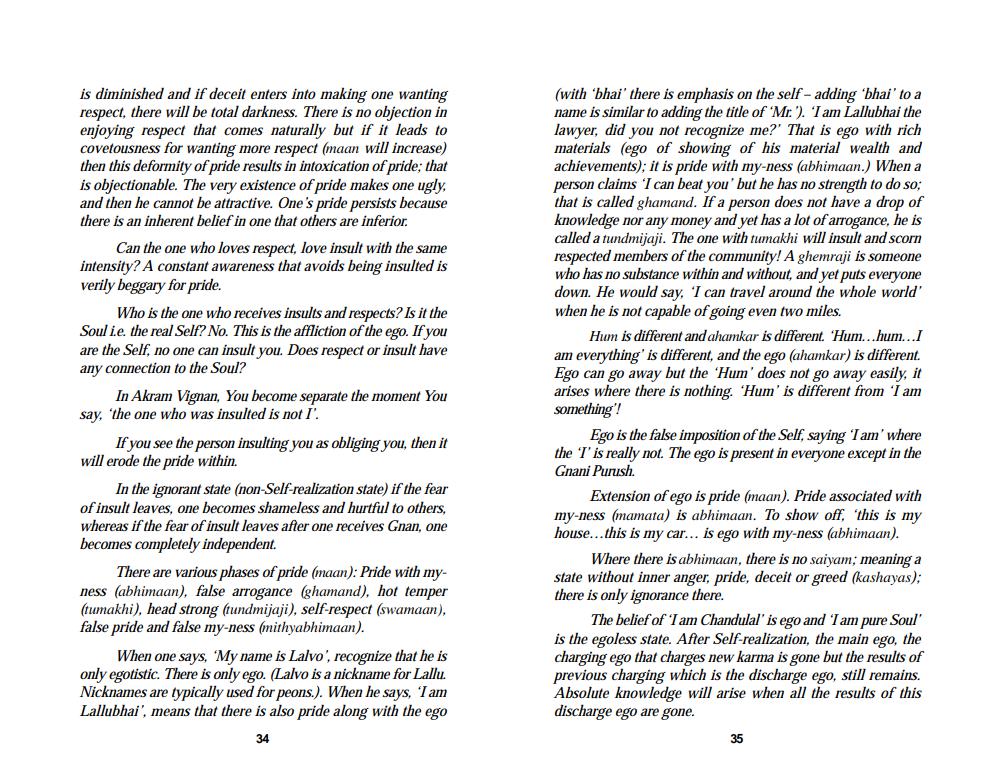________________
is diminished and if deceit enters into making one wanting respect, there will be total darkness. There is no objection in enjoying respect that comes naturally but if it leads to covetousness for wanting more respect (maan will increase) then this deformity of pride results in intoxication of pride; that is objectionable. The very existence of pride makes one ugly, and then he cannot be attractive. One's pride persists because there is an inherent belief in one that others are inferior.
Can the one who loves respect, love insult with the same intensity? A constant awareness that avoids being insulted is verily beggary for pride.
Who is the one who receives insults and respects? Is it the Soul i.e. the real Self? No. This is the affliction of the ego. If you are the Self, no one can insult you. Does respect or insult have any connection to the Soul?
In Akram Vignan, You become separate the moment You say, 'the one who was insulted is not I'.
If you see the person insulting you as obliging you, then it will erode the pride within.
In the ignorant state (non-Self-realization state) if the fear of insult leaves, one becomes shameless and hurtful to others, whereas if the fear of insult leaves after one receives Gnan, one becomes completely independent.
There are various phases of pride (maan): Pride with myness (abhimaan), false arrogance (ghamand), hot temper (tumakhi), head strong (tundmijaji), self-respect (swamaan). false pride and false my-ness (mithyabhimaan).
When one says, "My name is Lalvo', recognize that he is only egotistic. There is only ego. (Lalvo is a nickname for Lallu. Nicknames are typically used for peons.). When he says, 'I am Lallubhai', means that there is also pride along with the ego
(with 'bhai' there is emphasis on the self-adding 'bhai' to a name is similar to adding the title of Mr. 'I am Lallubhai the lawyer, did you not recognize me?' That is ego with rich materials (ego of showing of his material wealth and achievements); it is pride with my-ness (abhimaan.) When a person claims 'I can beat you' but he has no strength to do so; that is called ghamand. If a person does not have a drop of knowledge nor any money and yet has a lot of arrogance, he is called a tundmijaji. The one with tumakhi will insult and scorn respected members of the community! A ghemraji is someone who has no substance within and without, and yet puts everyone down. He would say, 'I can travel around the whole world' when he is not capable of going even two miles.
Hum is different and ahamkar is different. 'Hum...hum...I am everything' is different, and the ego (ahamkar) is different. Ego can go away but the 'Hum' does not go away easily, it arises where there is nothing. 'Hum' is different from 'I am something'!
Ego is the false imposition of the Self, saying 'I am' where the T' is really not. The ego is present in everyone except in the Gnani Purush.
Extension of ego is pride (maan). Pride associated with my-ness (mamata) is abhimaan. To show off, this is my house...this is my car... is ego with my-ness (abhimaan).
Where there is abhimaan, there is no saiyam, meaning a state without inner anger, pride, deceit or greed (kashayas): there is only ignorance there.
The belief of 'I am Chandulal' is ego and I am pure Soul is the egoless state. After Self-realization, the main ego, the charging ego that charges new karma is gone but the results of previous charging which is the discharge ego, still remains. Absolute knowledge will arise when all the results of this discharge ego are gone.




